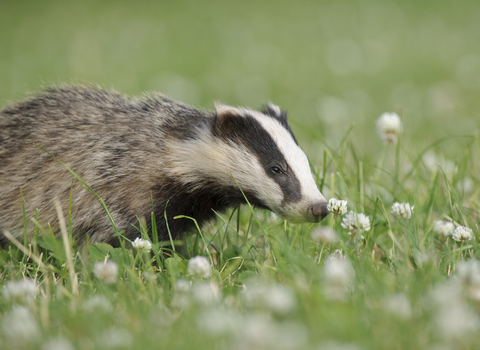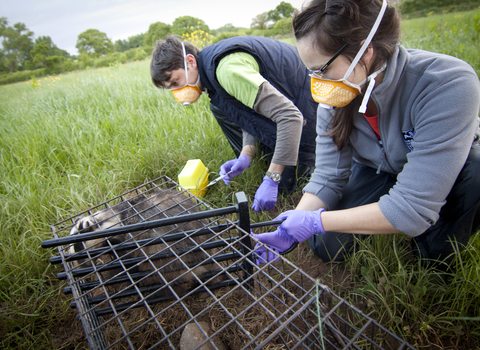Updated 6th September - Own goal: Government considering badger cull in new areas where they have funded successful vaccination programmes
Bertie Gregory/2020VISION
Good News for badgers! Today the Government announced badgers won’t be culled in Derbyshire this year
Ellie Brodie, Senior Policy Manager, The Wildlife Trusts said:
“The Wildlife Trusts welcome the Secretary of State’s decision today to pause the licencing of badger culling in the bovine TB edge area of Derbyshire. Today’s news means that Derbyshire Wildlife Trust, who are working with farmers and landowners on the largest badger vaccination project in the country, will be able to confidently continue their work. We are hugely relieved that for the time-being at least, healthy, vaccinated badgers will not be at risk of being culled.”
Read the announcement here
—————————————————————————————————————————————————————————————————
Wednesday 21 August 2019
The government is due to announce a new round of badger culls in England and is considering new cull areas where they have been paying for successful badger vaccination programmes. The government’s advisor, Natural England, is said to have received 14 applications from prospective culling companies to cull badgers in ‘high risk’ (of bovine tuberculosis - bTB) and ‘edge area’ counties of England. It can approve 10 of these areas. This would increase the number of cull zones stretching from Cornwall to Cumbria to over 40.
Derbyshire is one of the 14 new areas being considered for a cull zone. Over the last five years, Derbyshire Wildlife Trust has been running the UK’s largest badger vaccination programme with over 100 volunteers to help stop the spread of bTB in the badger population as an alternative to culling. They have been demonstrating that there is a humane way to tackle bTB that is cheaper per badger than culling. Derbyshire Wildlife Trust has had £280,000 worth of government funding from the Department of Environment, Food and Rural Affairs (Defra) towards this work – yet the government is still considering applications to bring the cull to Derbyshire.
The badger cull is a dangerous distraction from addressing the main route of bTB transmission in cattle
Ellie Brodie, Senior Policy Manager, The Wildlife Trusts says:
“It is unacceptable that the government is planning to forge ahead with another year of ineffective and expensive badger culling. It is absurd that the government are paying to protect badgers through vaccinating them, while also considering applications to kill them, as they are in Derbyshire. The badger cull is a dangerous distraction from addressing the main route of bTB transmission in cattle which is between cattle – as the findings from their own independent review has confirmed.”
Tim Birch, Head of Living Landscapes, Derbyshire Wildlife Trust says:
“Despite our Trust’s successful vaccination programme, Defra has listed Derbyshire for the cull expansion this year. That means the badger cull could come here as early as September. We’re deeply concerned that this could result in the deaths of thousands of healthy badgers including ones that have been vaccinated – it would cause significant disruption to our ongoing badger vaccination programme. Our dedicated team will continue vaccinations despite the potential arrival of a cull to look after this iconic and protected British species.”
Work being done in the south west by Wildlife Trusts shows that farmers in high risk areas for bTB have a real interest in badger vaccination, with groups of farms involved in successful vaccination across their land. Vaccination needs to be available and affordable to farmers not only in ‘edge areas’ but everywhere.
In mid-Cornwall a group of farmers approached Cornwall Wildlife Trust to find out more about vaccination of badgers and now pay for vaccination across a 20km squared area. Over a 4 year period the Trust expects tuberculosis levels in the badger population to fall as any diseased badgers die-off and are replaced by vaccinated animals. Badger vaccination won’t eradicate TB in cattle on its own, as badgers are only a small part of the problem. The best estimate indicates that between 6 and 24% of TB-affected herds acquire infection from badgers. However, it will remove badgers from the equation of TB in cattle and allow other preventative measures to be focused on, including the larger issue of cattle-to-cattle transmission, responsible for at least 75% in infected herds.
Cheryl Marriott, Head of Conservation, Cornwall Wildlife Trust says:
“Our plan was to just vaccinate badgers on our own nature reserves, but when local farmers asked us to help them we had to say yes. We have now vaccinated 75 badgers across the area and we are keen to hear from more farmers and landowners to see if we can expand the area next year. There is some frustration that there is currently no government funding for badger vaccination in the ‘high-risk’ area and farmers in mid-Cornwall and Cornwall Wildlife Trust have asked for this to change.”
bTB can have a devastating impact on the lives of farmers. The Wildlife Trusts continue to work with farmers to find solutions that work for everyone. Badger vaccination is cost-effective and it works. It reduces the incidence, severity and long-term vulnerability of badger groups to the disease. If government strategy must focus on badgers, badger vaccination offers a far more effective, cheaper and low-risk way to reduce bTB in badger populations.
The government has promised to leave the environment in a better state for the next generation. Continuing and expanding the badger cull undermines this promise and risks pushing one of our protected native species to the verge of local extinction.
The Wildlife Trusts call on the government to:
- Halt the badger cull now.
- Invest in and promote a strategy for badger vaccination. This should be led and funded by the government, across England.
- Invest more time and resource in further research into farm biosecurity and movement controls. We need to know what works.
- Accelerate development of more effective tests for bTB in cattle and put serious investment into a bTB cattle vaccine. This is a cattle problem, not a wildlife problem.


